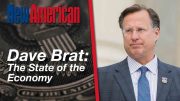
There was something for everyone in the release last week by the Congressional Budget Office of its August update and outlook. The federal government’s revenues are expected to top $3 trillion this year for the first time in history, thanks to individual income taxes rising by six percent, payroll taxes by eight percent, and corporate income taxes by 15 percent. Those infatuated with big government are celebrating the event as a reflection of an improving economy resuscitated by government spending and stimulus programs. Small government advocates, on the other hand, are decrying the event by reminding those who will listen that that is $3 trillion extracted from the economy, starving it of much-needed investment capital, consequently making the economy much weaker than it otherwise would be.
The CBO announced that the federal budget deficit for the year will amount to a paltry $506 billion, some $170 billion lower than last year. It noted that: “At 2.9% of gross domestic product (GDP), this year’s deficit will be much smaller than those of recent years (which reached almost 10% of GDP in 2009) and slightly below the average of federal deficits over the past 40 years.” Cue the trumpets from the Left: Despite huge increases in government spending to fight the Great Recession, the economy is now rebounding strongly enough to reduce the deficit substantially.
Unfortunately, the CBO goes on to point out that “later in the coming decade … deficits [will] grow and federal debt [will] climb.” The national debt, according to the CBO, will be $27 trillion in 2024. Cue the trumpets from the Right: We told you so.
The reason for the increasing deficits over time is simple: Government spending is projected to outpace the government’s revenues. Projected outlays for 2014 are estimated to be $3.5 trillion but increase to more than $4.1 trillion in just three years. By 2024, the CBO estimates that government spending will be close to $6 trillion a year and continuing to grow by nearly four percent annually thereafter. With the economy struggling to get back to three-percent annual growth, one can see that this is a race that the economy cannot win.
With a national debt approaching $18 trillion, that translates into more than $200,000 of federal debt for every private-sector worker, according to Terence Jeffrey writing for CNS News. This is up from $66,000 in 2000 and $100,000 in 2007. In other words, the federal debt burden on each private-sector worker has more than tripled in less than 15 years. Assuming the CBO is correct in its assumptions, therefore, the federal debt burden on each private worker in the economy will easily exceed $300,000 by 2024, thus raising the question: How will he pay it off?
According to the Russell Sage Foundation, the typical household has seen its net worth decline by more than a third just over the last 10 years, from $88,000 in 2003 to $56,000 today. According to the foundation, most of the damage was done thanks to the Great Recession, which decimated home values and forced millions to walk away from their homes, unable to make their mortgage payments.
A report released last week by the Social Security Administration reveals that more than half of American wage earners make less than $30,000 year. That translates into less than $600 a week, and many of them are using food stamps to help buy food. Robert Doar, writing at Real Clear Markets, discovered that despite declines in unemployment rates, food stamp usage — now called SNAP — actually increased in April and then again in June. For most of SNAP’s history when the economy rebounded the number of recipients of food stamps declined. Said Doar:
From 1969 until 2003, SNAP has been very responsive to changes in the unemployment rate, with the number of recipients rising as unemployment rises and declining as unemployment declines.
But that seems to have changed. As unemployment declined between 2003 and 2007, the number of SNAP recipients marched steadily higher. Then, as the Great Recession hit, the SNAP caseload went even higher.
With Americans increasingly unable to sustain themselves with wages that are declining in purchasing power, they aren’t able to save any money for retirement. The latest report from Bankrate.com noted that 69 percent of 18- to 29-year-olds haven’t saved anything, along with 33 percent of 30- to 49-year-olds, 26 percent of 50- to 64-year-olds, and 14 percent of people 65 and older. Conclusion: Over a third of all Americans have saved no money for retirement.
With finances in such disastrous shape it’s fair to ask again just how the average American is going to be in any position to pay off his share of the national debt. The answer is, he isn’t. If that’s the case, the next question is, how will the national debt be paid? The answer to that is, it won’t be.
Herbert Stein served as chairman of the Council of Economic Advisers under Presidents Richard Nixon and Gerald Ford and then taught economics at the University of Virginia until just a few years before his death in 1999. He is perhaps best known as Ferris Bueller’s teacher in the movie Ferris Bueller’s Day Off. He is also well-known as the formulator of “Herbert Stein’s Law,” which he expressed as: “If something cannot go on forever, it will stop.”
What will it take to end the explosion in government spending, annual deficits, and the national debt? Absent any perceived and potentially successful reining in of government spending, the only other option, according to Robert Romano, writing for Americans for Limited Government, is default:
We’re more likely to default than to ever pay it off. The national debt has increased every single year since 1958 to its current level. Who really believes that trend will be reversed?
What will trigger such a default? That will only happen when the buyers of U.S. government debt finally wake up to realize that the AAA rating on U.S. Treasuries is a myth and a fraud and then end the financing of a government addicted to spending beyond its means.
A graduate of Cornell University and a former investment advisor, Bob is a regular contributor to The New American magazine and blogs frequently at www.LightFromTheRight.com, primarily on economics and politics. He can be reached at [email protected].



